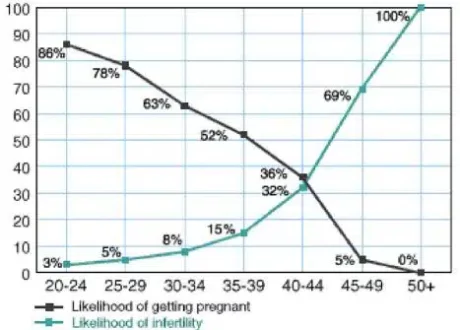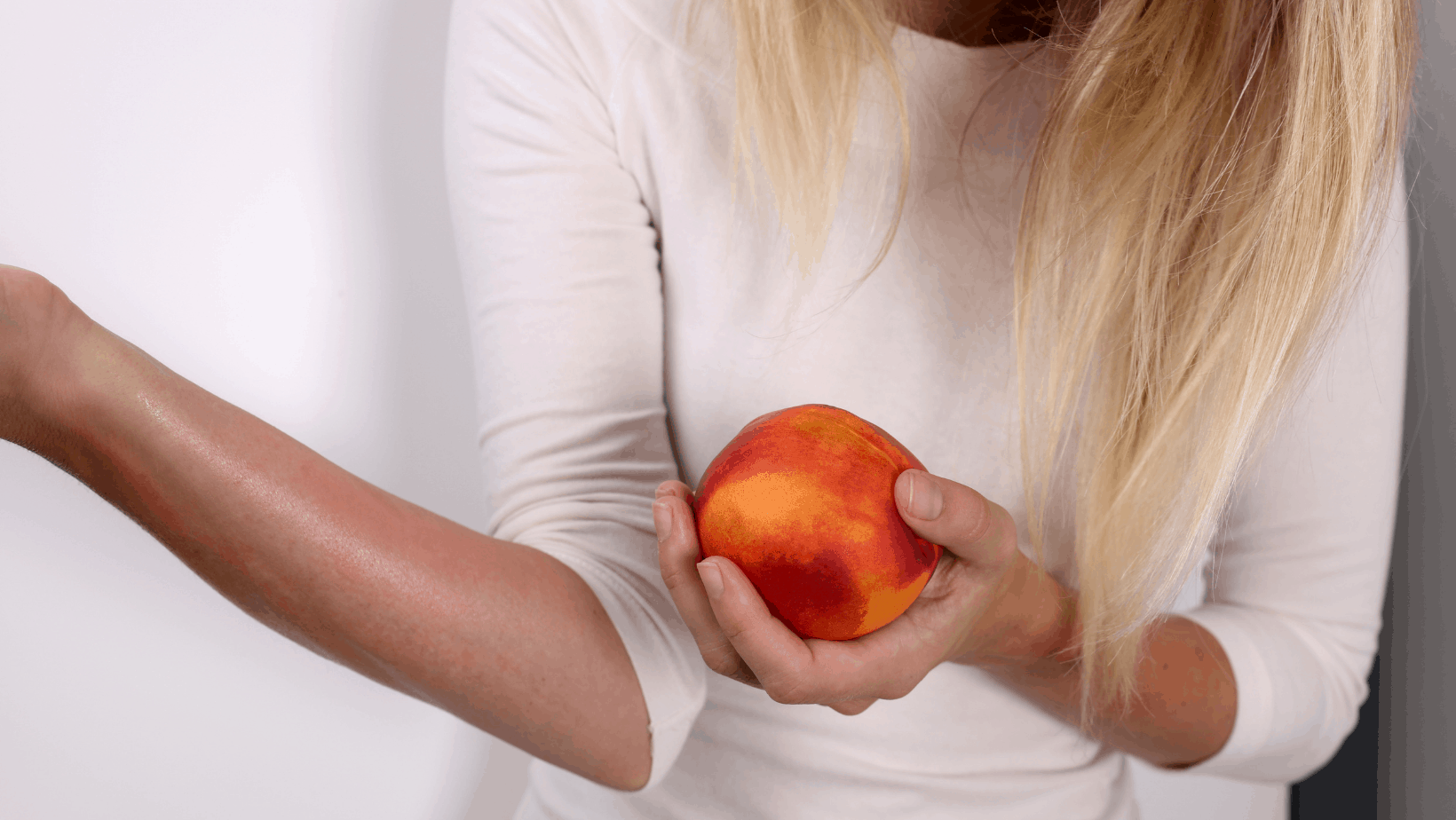An issue for couple at any time during the reproductive years, a “whole person” approach that encompasses both people in the partnership can often achieve great success.
What is Infertility?
Female Infertility is defined as the inability of females to conceive after one year of unprotected sexual intercourse.
How common is Infertility?
In the Western world, it is estimated that infertility affects approximately 12% of women and 1 in 6 couples have trouble conceiving.
The average time it takes to conceive is 4 to 6 months
- 25% of couples conceive within 1 month
- 60% of couples conceive within 6 months
- 85% of couples conceive within 12 months

Graph: Infertility rates in Women with normal reproductive function, after having unprotected intercourse for one year
Is this a Male or Female Problem?
The cause of low infertility can lie with either the male, the female or both.~ 20% are disorders of ovulation, ~ 30% disorders of fallopian tubes (blockages or damage), ~15% are associated with male infertility and the rest are unknown.
Ovulation difficulties:
Polycystic Ovary Syndrome (PCOS) is the most common underlying cause.
Premature ovarian failure – when the egg supply ends (only an egg donor and IVF is useful in this situation).
Overactive pituitary function can produce abnormal levels of prolactin, thus preventing ovulation.
Ovarian Cysts are responsible for many cases of female infertility.
Blocked Fallopian tube/s – this can be caused by:
- Chlamydia – the cause of blocked tubes for 70%
- Endometriosis – associated with tubal blockage and is the second most common cause of infertility (Studies indicate that between 30% and 40% of women with endometriosis are infertile and that between 25% and 50% of women with infertility have endometriosis)
- Other tubal damage may be caused by pelvic inflammatory disease, septic abortion, a ruptured appendix, previous tubal surgery, ectopic pregnancy.
- Tubal blockages may be able to be cleared surgically (usually via laparoscopy)
Other possible causes of Infertility:
- Age: the number of eggs declines from around 2-3 million at your birth to around 300,000 by puberty. With each menstrual cycle during reproductive years, 30-50 oocytes (eegs) are lost. In the 10 – 15 years preceding menopause, follicular loss increases as the body attempts to provide a healthy, dominant follicle
- Male infertility problems- read more here
- Luteal Phase Defect (ie problem occurs after ovulation)
- Coeliac Disease and/or other disorders leading to poor absorption of nutrients
- Uterine Fibroids
- Problems with fertilisation or implantation in the uterus
- A rare chromosomal abnormality called Turner’s Syndrome
- Excessive burden of toxic metals, radiation, chemical or pesticide exposure
- Undiagnosed genito-urinary infections
Tests & Examinations:
- Female – include blood and urine tests, to check that ovulation is occurring, and laparoscopy to determine whether or not an abnormality is present.
- Male – the initial investigation is seminal fluid analysis.
Pharmaceutical Drug Treatment
Failure of the woman to ovulate is normally treated with ovarian stimulation (usually Clomiphene, +/- a gonadotrophin hormone)
- Clomiphene – stimulates the Hypothalamus and Pituitary Glands by indirectly inducing the ovaries to ripen and release eggs. Increases the risk of Ovarian Cancer (by 250%) in those who use it for longer than one year.
- Chorionic Gonadotrophic Hormone – a synthetic pharmaceutical (administered by injection and accompanied by daily ultrasound, blood and urine tests) – often prescribed as an adjunct to treatment.
THE NATUROPATHIC APPROACH
Preconception Care
This may involve lifestvle and environmental changes, such as:
- improving lifestyle – eg reducing stress, stopping smoking, learning to relax, losing weight
- optimising the diet
- detoxification and cleaning up the and personal living environment
- recommendations for Psych-K, or NLP – get your mind on board with your desires!
- getting fit – taking up exercise, for example walking, yoga or rebounding 20 mins/day.
- using natural birth control methods
Nutrition and Toxicity
Nutrients are important in preconception care and fertility and will impact on the baby’s health and progress
Hair Mineral Analvsis Test: Shows deficiencies/excesses of many minerals and any heavy metal toxicity levels. More information about this test on our Tests Page
Any imbalances of mineral levels need to be addressed. Removal of any toxic loads of heavy metals needs to be dealt with carefully. If they are released from the tissues they are stored in and start circulating the body then this will effect the quality of sperm/ovum if conception occurs at that time. They ideally will need to be cleared from the system before attempting conception.
It is vital that your diet and environment is cleared of phthalates. These are endocrine disruptors and are responsible for a significant number of fertility and reproductive problems, including premature delivery.
or give us a call 09 846 5566
Natural Birth Control
- Charting mucous and temperature
- Timing techniques for achieving conception
- Lunar fertility is a great diagnostic tool to learn about hormone balance
You may also require screeninq for:
- Genito-urinary infections, e.g.bacteria,viruses, mycoplasmas, AIDS, Hepatitis (Symptoms of infection include unusual or offensive vaginal discharge, urinary frequency, low abdominal pain
- Allergies: anything that creates inflammation in the body can reduce your chances of conceptions. Common culprits are delayed or “hidden” allergies
- Airbourne pollutants e.g. cleaning/household solvents, chemicals, dust mites, pollen .
We may recommend regular laboratory testing plus other tests suggested by Francesca Naish & Janette Roberts in “The Natural Way to Better Babies, Preconception Health Care for Prospective Parents”
Your treatment may include natural remedies for improving your general health and improving reproductive health – ie treating underlying conditons such as PCOS, endometriosis, fibroids, cysts, autoimmune disease etc, as well as investigating recurrent miscarriage, We have a wide range of tests for assessing hormone function. Read about them here.
Ideally both partners should attend an appointment – although it is not essential that this be done at the same time. Rest assured that you will be treated with the utmost respect and confidentiality. As a basic tenet of natural medicine is discovering the causes of problems, we will thoroughly investigate all possible avenues.
We request that you obtain copies of all tests done by your doctor, if applicable, the enable us to target your regime from the outset.
Read more about hormone testing at House of Health here or give us a call 09 846 5566












